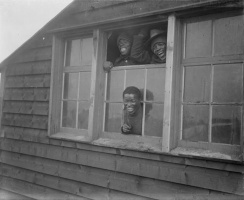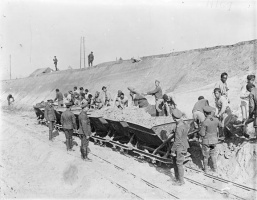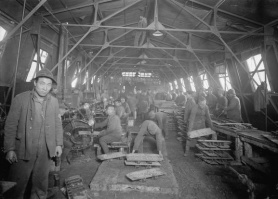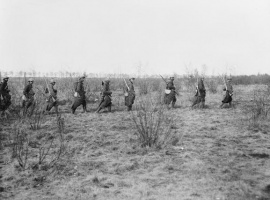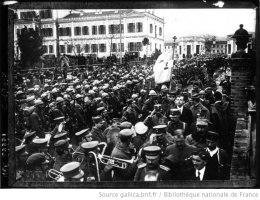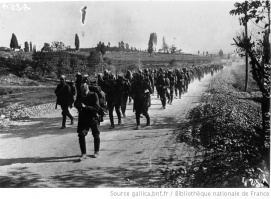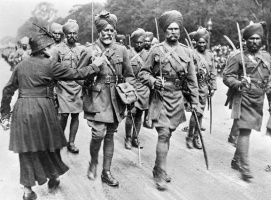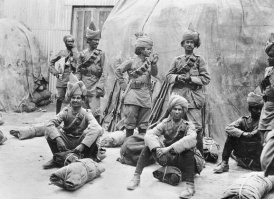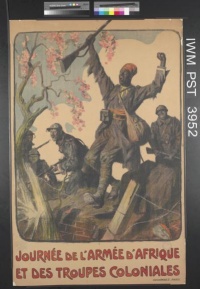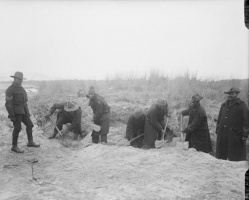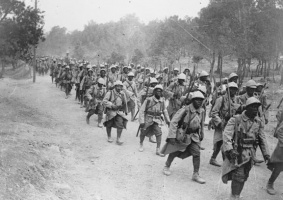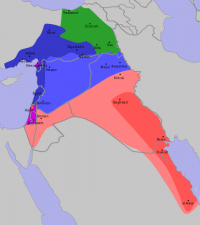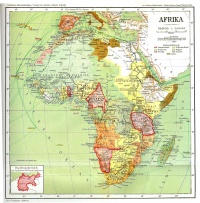Introduction↑
From a colonial perspective the First World War did not end cleanly. Major combat operations on the Western Front may have ceased on 11 November 1918, but a raft of smaller conflicts, some of which had emerged out of the upheavals of 1914-1918 and others which were only tangentially related to the Great War, lingered on into the immediate post-war years. For example, it was not until spring 1919 that, rather belatedly, German efforts launched at the start of the war to stoke an Afghan challenge to the British Raj actually bore fruit. The Third Anglo-Afghan War was more than just a continuation of the seemingly interminable struggle between British imperial and Afghan forces along India’s north-western frontier. It was, in part, the continuation of Germany’s Weltkrieg, an attempt to globalise the European struggle of 1914-1918 in order to distract the Entente powers from the main theatre of operations.[1] Unfortunately for Wilhelm II, German Emperor (1859-1941), the German army was defeated on the Western Front before this globalisation of the war could achieve its aim of forcing the British to choose between a European victory and their empire.
The Third Anglo-Afghan War was not an isolated event in the wake of the First World War. Indeed, the decade following 1918 saw a major inter-state conflict being replaced by myriad smaller ones, often within collapsing states and imperial polities. This was a point not lost on contemporaries. In particular it was noted by, and arguably defined the thinking of, the arch-pessimist of Britain’s post-war situation, General Sir Henry Wilson (1864-1922), the British army’s Chief of the Imperial General Staff. In a letter to Reginald Brett, Lord Esher (1852-1930) on 14 November 1919, Wilson argued that there were between twenty and thirty conflicts taking place around the world.[2] A year after its end, the much fabled "war to end all wars" had not brought peace and stability. Wilson’s sense of resignation with regards to the post-war situation only grew during the following years. By the time he retired he was forthright in expressing the view that the British Empire was far worse off than it had been at the start of the First World War. His farewell address to the Staff College on 21 December 1921 was entitled "The Passing of Empire," which neatly summarised his attitude about his term as Chief of the Imperial General Staff.[3] For Wilson, with Ireland having forced its way to independence, Egypt on the brink of negotiating a new settlement and India racked by mass political upheavals, the British imperial system seemed to be on the verge of collapse. This was a story, as Wilson saw it, not just of the flowering of anti-colonial nationalist movements, which were willing to use popular protest and violence to achieve their aims, but also of the inability of the British colonial state to deal with internal dissent. The loss of Ireland was thus the culmination of a persistent "lack of government," with politicians retreating from the difficult choices that the post-war world posed for the empire.
This tale of imperial woe was not confined to the British. The war left France with at least 1.3 million dead, worsening their demographic-military deficit within Europe. Such a costly victory did not provide France with the opportunity to rule over and develop its colonial territories in peace. Throughout the interwar years, the French Empire suffered numerous uprisings and witnessed the rapid development of anti-colonial nationalist movements. By the mid-1920s, Syria and Morocco had been torn apart by armed revolts. These were only contained through extensive and bloody military campaigns. In 1930-1931 French Indochina experienced a sustained uprising across significant portions of the colony, with much of the unrest led by the Indochinese Communist Party, a political force that would come to shape the region’s post-colonial future. Smaller-scale unrest also rocked France’s African possessions during the 1920s and 1930s. The Kongo Wara (meaning "the war of the hoe handle"), which broke out in June 1928, lasted for three years and demonstrated the limitations of French colonial rule in the African interior.[4]
One way of examining this post-war transition is to focus in on the confusion of the aftermath of the conflict, to highlight the violence and dislocation over attempts at imposing order and cohesion. This is a methodology that has been well-developed for the upheavals experienced between 1917 and 1923 in the European dynastic empires of the Habsburgs, Romanovs, Hohenzollerns and Ottomans.[5] In central and eastern Europe, competing revolutionary and counter-revolutionary forces stepped into the power vacuums left by the collapse of these imperial regimes. Within the extra-European colonial world during the Great War and its aftermath, with the exception of the Middle East, comparable power vacuums were relatively infrequent. When they did occur they were rapidly filled by competing imperial powers. In the colonies of Togoland and the Cameroons for instance, German colonial administration was replaced by French and British rule during the first half of the war.[6] In many other parts of the colonial world, the First World War offered little opportunity for a change in the colonial regime. Crucial French possessions, such as Algeria and Indochina, or the key elements in the British world system, India, Egypt and the white settler Dominions, remained unchanged at the end of the war.
Even Portugal and Italy, respectively the weakest and newest extra-European colonial powers before the First World War, were able to retain their tenuous control over territories such as Libya and Mozambique in the conflict’s aftermath. This was despite the fact that maladministration, military incompetence and a complete inability to invest in and economically develop their colonies ensured that the Portuguese and Italian colonial states only had a tentative hold over their subject peoples. Both faced significant colonial uprisings during the course of the war, far worse than those experienced by Britain or France. In Libya, Italy lost control of most of its territory, with its administration pushed back to a small number of coastal towns. At Misrata in April 1915, over 1,000 troops were killed in a clash with Senussi rebels. It was left to the British to contain the jihadist threat along the Libyan-Egyptian border, while the Italians ceded de facto control of much of Cyrenaica to the indigenous population.[7]
For Portugal the war was an imperial disaster. Both Angola and Mozambique experienced numerous anti-colonial rebellions, fuelled in part by German military incursions. The use of local auxiliaries to suppress rebel movements only served to increase the fragility of the Portuguese Empire in Africa and exacerbate inter-ethnic tensions and rivalries.[8] Despite the chaos of the wartime experience for both the Italian and Portuguese Empires, their decision to join the Entente cause ensured that they ultimately emerged from the war with their empires intact. Moreover, numerous colonialist politicians in both states, notably the Italian Foreign Minister Gaspare Colosimo (1859-1944) and Portuguese Prime Minister Afonso Costa (1871-1937), saw the war as an opportunity to promote their respective imperial causes, although with varying degrees of success.
These examples drawn from the varied Allied experience of 1914-1918 suggest that the East and Central European model of imperial collapse as the defining element of the Great War experience cannot survive beyond the boundaries of Europe. In many respects the Middle East offers the greatest insight into how the colonial empires of the victorious powers, principally France and Britain, experienced the aftermath of the First World War. Here Ottoman imperial authority had been progressively eroded over four years of bitter fighting and witnessed the strenuous mobilisation of local populations and economies across the empire.[9] The five years following Ottoman collapse in October 1918 saw Britain and France jockeying for power across the Middle Eastern world, attempting to fill the post-Ottoman imperial power vacuum with new colonial states. European powers were not the only contestants in this process, coming up against nascent Arab nationalist movements and a flourishing Zionist cause. The Middle East fits neatly into the conception of an imperial "shatter zone" in the wake of the First World War, with states and sub-state actors vying for power. Moreover, this was a region of imperial experimentation, where ideas for a new form of imperial rule – the League of Nations’ mandate system – were put into practice. Mandates were applied to multiple colonial territories around the world but it was in the Middle East that they proved most contentious and where this attempt at international oversight of colonial rule often failed.
European colonial empires in the first half of the 20th century were vast polities, encompassing a bewildering range of landscapes, peoples, religions and cultures. Inevitably, given the limitations of space, this article will only touch on a small selection from this diverse mix. As an imperial "shatter zone" that witnessed nationalist revolt, the imposition of new colonial regimes, and attempts at high-minded international control, the Middle East provides the contextual backbone to the argument which follows on the colonial empires after the First World War. Space also precludes a wide-ranging survey across all of the European colonial empires. The Dutch, Belgian, Italian and Portuguese experiences, although significant for the colonial administrations and subject populations involved, did not play a defining part in global power relations after the Great War. The focus here is on Britain and France, the principal extra-European colonial powers in 1914 which remained dominant, if not even more so, on the imperial stage at the war’s end. It was, after all, the division of the war’s spoils between these two imperial powers which would govern the discussions at the peace conferences for the five years following the war and continue to shape international relations into the late 1930s. France and Britain were great powers when they went to war in 1914, in part, because of their status as colonial powers. This picture was not altered by the events of the First World War. In some respects, their great power status was only enhanced by the conflict, as former rivals, namely the Ottoman, Austro-Hungarian and German Empires, disappeared in its wake.
At the heart of the story of the French and British colonial empires in the aftermath of the First World War is the question of whether the conflict marked a shift towards decolonisation. 1914-1918 can be seen as paralleling, or anticipating, the events that would follow thirty years later when the Second World War invigorated a series of anti-colonial nationalist movements that would ultimately pull down the imperial edifice by the mid-1960s.[10] The changes in sovereignty inherent in decolonisation, as well as the related alterations in social, cultural and economic norms associated with the collapse of colonial regimes, had their roots in the events of 1917-1918. The Bolshevik Revolution of October 1917 seemingly heralded a new age in which imperial rule could no longer survive as oppressed subject populations mobilised politically. Woodrow Wilson's (1856-1924) Fourteen Points Speech in January 1918 pushed the idea of an altered international framework even further.[11] He was clear that America would not accept an annexationist peace at the end of hostilities, one in which the colonial powers would merely reshuffle the imperial deck. Instead, national self-determination became the guiding principle. By November 1918, the dominance of Wilsonian and Bolshevik thinking on an end to imperial aggrandisement had even resulted in an Anglo-French declaration that self-determination should be applied to the subject peoples of the Ottoman Empire. The world of autumn 1918 was one which felt very unsafe, particularly in ideological respects, for the colonial empires, both victorious and defeated.
This imperial insecurity was only enhanced by Wilson and Vladimir Lenin’s (1870-1924) ideas which were tearing up the old imperial regimes of central and eastern Europe. Revolutionary upheaval had become the norm across Germany, Russia and Austria-Hungary by the end of 1918. In this bloody world of revolution and counter-revolution the European dynastic empires did not survive: Kaiser Wilhelm abdicated on 9 November 1918, Charles I, Emperor of Austria (1887-1922) went into exile on 12 November and Nicholas II, Emperor of Russia (1868-1918), forced out in 1917, was executed a year later. From this perspective, the First World War had unleashed a wave of decolonisation within Europe.
This was nowhere better illustrated than in the collapse of the Tsarist Empire, which before the war had dominated vast swathes of Eastern Europe, Central Asia and the Caucasus and helped to define Russia’s great power status. As Joshua Sanborn has illustrated, the upheavals involved in mobilising the imperial state and its disparate peoples to fight the First World War proved far too great a challenge.[12] In particular, the imposition of martial law along the Eastern Front battle zone and deep into its rear areas, served primarily to undermine the legitimacy of the centralised imperial administration as local officials and military commanders competed for control. Much more worryingly, it unleashed an ethno-political dynamic, often brutally violent in nature, which tore at the already tenuous unity of the empire. When the Tsarist imperial regime fell in 1917 followed by the collapse of the Provisional Government, events precipitated as much by battlefield defeat as internal economic and political mismanagement, a raft of ethno-nationalist polities emerged in the Russian Empire’s borderlands. It was here that local officials, nationalist politicians, warlords and "White" opponents stepped into the power vacuum provided by the collapse of the state to forge new local and regional regimes. By the close of the civil war in 1921 the Bolsheviks had succeeded in quelling the vast majority of these challengers. Finland, the Baltic states and Poland had, however, broken free of Moscow; for these new nations the First World War and its aftermath represented a clear decolonising moment. For the peoples of Ukraine, the Caucasus and central Asia the reverse was true. Although having briefly tasted freedom from Russian control, by the early 1920s the Bolsheviks had succeeded in re-colonising these borderland areas, the only difference being that imperial authority was now replaced by the centralised control of the party machine.
The concept of re-colonisation was also evident in the manner in which the German Empire viewed aspects of its war on the Eastern Front.[13] Military success against the Russian Army produced a new imperial domain, formerly on the fringe of the Russian Empire, which now came under German control. For expansionist-minded sections of the German military, as well as right-wing radicals and state bureaucrats, this new colonial space offered a chance to build a buffer zone against future Russian aggression. Moreover, it provided a new region of settlement and colonisation at exactly the moment when Germany’s extra-European empire was being dismantled by Allied military campaigns. By 1918, Germany’s colonies in South-West Africa had been overrun and in east Africa Colonel Paul von Lettow-Vorbeck’s (1870-1964) forces were increasingly harried, although largely undefeated, and in the Pacific and China Germany’s holdings had been eviscerated in acts of sub-imperial aggrandisement by Australia, New Zealand and Japan. Eastern Europe, in particular the unrealised opportunities provided by Ukraine to sustain the German war effort through its grain supplies, offered a chance to turn the tide of the conflict through imperial expansion. German defeat on the Western Front ensured that such dreams of a continental empire, with all its ethnic complexities, were destroyed by the end of 1918. The challenge of Bolshevism – both an internal and an external one in the wake of the war – and the emasculation of Germany’s extra-European empire at Versailles ensured, however, that dreams of colonising Eastern Europe would not be forgotten in the interwar years. These would emerge, reinvigorated and based around a destructive ethno-political ideology, as central to the Nazi "imperial" project of the 1930s and 1940s.
The idea of the First World War as a decolonising moment influenced the victorious colonial powers as well. For much of the interwar period, the spectre of imperial collapse, not least that instigated by the Bolshevik Revolution, would haunt colonial administrators in London, Paris and peripheral territories, as well as inspire many anti-colonial nationalists.[14] The British and French colonial empires, however, survived this moment of decolonisation intact, and even enhanced. As A.S. Kanya-Forstner has suggested, the First World War had little import as a decolonising moment for Britain and France, although it did suggest the inherent vulnerabilities of their imperial systems.[15] In this light it is possible to read into Henry Wilson’s fears in 1921 a prescient, rather than paranoid, sense that the European colonial regimes – his assessment of Britain could easily be applied to France – were already fundamentally weakened and that their end was only a matter of time. This is the supposition this article will tackle: to what extent were the British and French colonial regimes teetering on the brink of their demise in the wake of the First World War?
Mobilising and Demobilising the Colonial Empires↑
In order to grasp the shifts in the nature of colonial rule in the wake of the Great War, it is first necessary to consider how the colonial empires mobilised and adapted to fight the conflict. For France and Britain their colonial territories were a vast reservoir of vital raw materials which could fuel their industrial war efforts. More importantly, their empires provided manpower on such a scale as to offset their quantitative disadvantages on European battlefields. During 1914-1918 the Entente deployed over 650,000 soldiers from its colonies in Europe. France, in particular, was heavily reliant on the men it enlisted from its African possessions which contributed 172,800 Algerians, 134,300 West Africans, 60,000 Tunisians, 37,300 Moroccans and 34,400 Madagascans to the defence of the metropole.[16] This reliance on imperial troops was remarkable given the fact that no Third Republic government had previously given serious consideration to drawing on its African manpower reserves. The idea of reinforcing France’s military potential within Europe through the deployment of African soldiers had previously been floated by the powerful colonialist lobby. Adolphe Messimy (1869-1935) had argued for an Algerian army of 100,000 men and Colonel Charles Mangin (1866-1925) advocated for an even larger force noire with which to repel European opponents. These schemes met with little success prior to 1914. As a consequence, France only had 35,000 Algerians and 30,000 tirailleurs sénégalais under arms when it went to war.[17]
The appalling losses endured by the French Army on the Western Front meant that colonial manpower would increasingly take on a greater share of the fighting. By the time Georges Clemenceau (1841-1929) had become premier in November 1917, French Africa had provided an additional 270,000 troops. Recruiting in the colonial empire relied both on volunteers and conscription, with the balance shifting increasingly towards the latter as the war dragged on and tales of the horrors of the front line were disseminated by returning injured veterans.[18] Casualty rates in front line colonial units were high, particularly among tirailleurs sénégalais who came to be used as shock troops in the latter years of the war. 31,000 French African troops were killed during the war with an overall loss rate of 22 percent, comparable to that of French infantry.[19] The perils of military service and the growing exactions placed on French colonies to meet recruiting targets led to resistance from subject populations. In Algeria, a rebellion around Batna in late 1916 acted as a break on the colonial administration’s attempts to extract men. Armed protest was not the only way to resist the colonial state’s need for manpower. On reaching villages, recruiters in West Africa increasingly found that young men suitable for military service had fled into the bush or were malingering with self-inflicted wounds. However, uprisings in Western Volta in 1915-16 and Dahomey in 1916-17 were only partly attributable to the demand for wartime military manpower. Bringing the mobilisation methods of "total war" to the periphery of empire was often the final step that exacerbated longer-term problems of limited local legitimacy facing colonial administrations.
British imperial recruiters experienced many of the same obstacles when trying to extract manpower from colonies in Africa and South Asia. Indeed, colonial recruiting mechanisms themselves were often far from perfect, heightening the difficulties faced when trying to get recalcitrant colonial subjects to sign up for military service often far from home and in defence of a remote imperial regime. In November 1914, a colonel carrying out a recruiting tour of local villages near Amritsar in northern India found himself to be one of forty-two competing regimental recruiting parties in the neighbourhood. Despite such obstacles Britain was able to raise a considerable imperial army during the course of the First World War. In particular, India proved a fertile recruiting ground, providing nearly 1.5 million combatants and non-combatants.[20] As with France, Britain recruited extensively in Africa and the King’s African Rifles grew to be 30,000-men strong by the end of the war.[21] More staggering was the enlistment of even larger numbers of Africans to serve as porters and labourers along the tenuous lines of communication necessitated by campaigns in Africa where road links were often non-existent and horse-borne transport was impossible due to disease. British West African colonies raised 57,500 carriers, East Africa and Nyasaland provided 200,000 each and Uganda 19,000. The East African campaign was fought on the backs of African labour.[22]
It was not only colonial soldiers who contributed to the French and British imperial war efforts. As important were the large numbers of civilian labourers recruited to work in French factories, maintain the lines of communication and run the array of support services that modern armies required to wage a "total war" on the Western Front. Nearly 50,000 Indochinese workers served alongside 35,000 Moroccans, 18,500 Tunisians and 76,000 Algerians. Britain deployed 215,000 labourers from the colonial world to Europe, including over 31,000 black South Africans and 92,000 Chinese workers.[23] The First World War was not only a moment of military upheaval but one of mass migration, with labouring populations flowing around the world to meet wartime demand. This was a process highly disruptive to colonial economies, particularly those based on manpower-intensive agrarian production.
The mobilisation of the British and French colonial empires during the First World War offers striking contrasts in attitudes to the use of colonial soldiers which would greatly shape post-war political agitation in colonial territories. In the British case voluntarism remained the guiding principle. With the exception of New Zealand and Canada, Britain’s imperial army was made up of volunteers. In India and Africa, by the later stages of the war, the nature of this voluntarism was open to question. Inducements from recruiting parties, pressure on local community elders and what amounted to press gangs all became common. In contrast, French recruitment made use of conscription, fundamentally altering the relationship between the imperial combatant and colonial state; this opened up a dangerous route to claims of citizenship derived from collective blood sacrifice in defence of the metropole.
The different uses to which these colonial armies were put is also striking. In the French case, West and North African troops were primarily recruited to defend France from German aggression, a task which required their deployment on European battlefields. For Britain, non-white colonial troops, with the exception of the Indian Corps on the Western Front in 1914-1915, were used for combat outside Europe, primarily in the Middle East and Africa. France mobilised its colonies to defend the metropole, whereas Britain’s colonies were mobilised at first to defend the empire, then to expand it.
Britain’s decision to use colonial resources to wage a principally imperial war in 1914-18 would come to shape the post-war peace settlements, particularly as they were applied to the former territories of the Ottoman Empire. In a very basic sense, by November 1918 Britain possessed a clear strategic advantage in the Middle East. Indian Army formations occupied much of the territory from Egypt to Mesopotamia. On the other hand, French ambitions, as evinced by the colonialist lobby and selected ministers rather than the government, to rule over a Greater Syrian colony were in many respects a fantasy that ignored very basic realities on the ground.[24] French troops in 1918-1919 lacked the manpower to impose any form of French rule in Syria. Instead the British and their Hashemite allies in the form of Faysal I, King of Iraq’s (1885-1933) nascent Arab administration in Damascus were able to dictate the pace of events. Despite the wartime division of the Middle East between the two powers in the Sykes-Picot agreement of February 1916, it was not until September 1919 that France was able to begin its expansion into Syria. Mounting imperial commitments and crises had by this stage forced the British Prime Minister David Lloyd George (1863-1945) to relinquish Britain’s military occupation temporarily.
For France, the ability to continue to mobilise colonial subject populations was a key requirement of any post-war peace settlement. The war persuaded Clemenceau that the empire could provide a viable substitute for French manpower which was in increasingly short supply given the losses of the conflict and a declining birth rate. During the negotiations at Versailles, the Colonial Minister, Henri Simon (1874-1926), remained intransigent on France’s ability to raise troops from any former German territories in Africa now acquired as mandates under the League of Nations. Colonel Edward M. House (1858-1938), Woodrow Wilson’s principal advisor, warned Simon that such a position would likely drive the US Senate to reject the peace treaty and any attempts to construct Anglo-American guarantees of French security. Nonetheless, Simon stuck to the demand and acquired British and American acceptance over the course of the winter of 1919-1920.[25] The experience of wartime had only entrenched within the French political establishment the need to see its colonial empire as a source of resources with which to defend the metropole.
In the wake of the First World War the pressing question for Britain and France was less one of future mobilisations and more of how to demobilise their vast imperial armies. Returning soldiers proved not just a logistical nightmare, particularly given the post-war shortage of merchant shipping, but were also a potential source of domestic unrest. Many of the veterans returning to the French colony of Guinea resented the local chiefs who had helped force them into military service and, during 1919-1920, were at the forefront of industrial disputes, assaulting chiefs and settler plantation managers, symbols of the unequal colonial system of economic and political rule.[26] Many colonial territories were particularly unsuited or ill-prepared for the sudden injection of a large number of young male workers back into the economy. In the case of Jamaica, returning soldiers from the British West Indies Regiment were frequently disappointed by the lack of job opportunities within the restrictive plantation economy. The colonial administration was not willing to meet the veterans’ main demand for land, something they saw as a basic recognition of their military service and which would give them a symbolic stake in Jamaica’s colonial society. In the desperately poor economic conditions after 1918 Britain’s favoured employment scheme for these Caribbean ex-soldiers was to relocate them to Cuba’s sugar cane fields, thereby ensuring that the discontented were removed from the colony.[27]
In Senegal, the problems facing returning soldiers were not just economic. The colony was in crisis due to outbreaks of bubonic plague in most major urban centres during 1919 which killed at least 700 in Dakar and over 430 in Rufisque. Attempts by the colonial authorities to contain the problem were sluggish. Urban clearance and the isolation of infected individuals in quarantine hostels caused widespread local anger. In rural areas, vaccination schemes and the disposal of the dead ignored local customs, traditional medicine, religious practices and funeral rites. The colonial state appeared to be destroying indigenous society while at the same time professing to save it.
For many colonial soldiers, however, demobilisation could not come fast enough. Large numbers of troops from both the British and French Empires were retained after the end of hostilities to serve in occupation roles. Much of Britain’s newly acquired Middle Eastern empire was garrisoned by Indian sepoys and, more notoriously, France made prominent use of West African soldiers in the Rhineland, a tactic designed in part to demonstrate the absolute defeat of German militarism at the hands of France. It was, above all, a pragmatic solution to the pressing needs of wartime states which were adapting to the necessities of the post-war peace. It allowed the French and British Armies to demobilise their metropolitan soldiers first, assuaging demands at home and from the men themselves, while colonial troops were used as substitutes until the peace settlements were clarified.[28]
Colonial Reform↑
Wartime colonial mobilisation and the service of large numbers of colonial soldiers and labourers in Europe or in defence and expansion of empire impressed upon London and Paris the need for colonial reform. In some respects, this was portrayed as a reward for the wartime service of these colonial peoples, demonstrating that imperial rule was a reciprocal and benevolent practice. More pertinently, it was a way to assuage the demands of politically awakened veterans who would now claim greater rights and freedoms. From early in the war, for example, the Indian government worried about potential political upheaval from any number of anti-colonial opponents, whether armed Sikh militants, Bengali terrorists, or, following the Ottoman entry into the war, an increasingly active pan-Islamic movement. The viceroy, Frederic Chelmsford, Lord Chelmsford (1868-1933), was eager to pre-empt any potential challenges to the Raj and to respond to calls to reward Indian military service for the King-Emperor. Edwin Montagu (1879-1924), the new Liberal Secretary of State for India from 1917, was also critical of the bureaucratic mentality of the Raj’s civil administration and shared a desire to instigate reform. The war gave him the mandate required to shake up India’s government and to head off any political unrest at the same time. In August 1917 the Montagu-Chelmsford reforms were announced, promising the gradual development of self-governing institutions and the progressive realisation of responsible government with the proviso that India remained an integral part of the empire. These reforms (although rejected by the Indian National Congress, the principal nationalist organisation, which considered the measures to be too little, too slowly delivered) nonetheless set the pattern for British attempts at containing political opposition throughout the interwar years.[29] A focus on reform that emphasised local devolution of power to Indian politicians through the system of diarchy, in part motivated by a desperate attempt to avert Indian political attention from control of central government would dominate much of the political debate in the 1930s.
In the French Empire similar promises of reform were made to colonial populations as a reward for their wartime service. The efforts of Blaise Diagne (1872-1934), the first black African member of the Chamber of Deputies, had secured in early 1918 rights of French citizenship for the originaires, the assimilated inhabitants of Senegal’s four original centres of French colonisation. Once the war ended, Diagne integrated his campaign for ex-servicemen’s rights into a broader strategy designed to boost the prominence of representative institutions in West Africa. In 1919 his supporters were swept to victory in local and mayoral elections in the four communes, marginalising the settler interests that had previously dominated.[30] In Algeria, the need to boost recruitment in 1918 had led to the appointment of a new governor-general and a promise by Clemenceau to reform the indigénat, the system of native jurisdiction. Despite vociferous settler opposition, these wartime promises were eventually enshrined in the Jonnart Law of February 1919 which gave the vote in municipal elections to 400,000 Muslims and increased the Muslim electorate for the conseils généraux to over 100,000. French imperial rule seemed, on the face of it, to be subject to moderating forces and to be responding to the wartime sacrifices of its colonial subjects.
The reality was somewhat different. Compared to the steps being taken in India, which tied the nationalist movement into a constitutional settlement rather than radical activism, the French reforms in West and North Africa made little difference to the nature of colonial rule and the daily experience of racial subjugation. In West Africa, the General Council of which Diagne’s supporters had gained control in 1919 was quickly transformed into a Colonial Council. Twenty chiefs chosen by the governor-general were inserted to represent people from outside the four communes, men who could be relied upon to support the administration against the demands of the elected members. Elsewhere in French West Africa urban centres given the status of communes-mixtes where city councils were elected on limited franchises found that these bodies were merely advisory to their French mayors. Despite the wartime promises of French citizenship by 1936 there were only 2,000 African "citizens" outside the four communes. The mass of the population remained subjects, governed by summary administrative justice and collective fines and were often employed as forced labour.
The same story of restricted rights and limited reforms was evident in North Africa. Muslim voters in Algeria formed a separate electoral college and could only vote for their representatives. The settler community retained its political dominance despite its numerical inferiority. Although new electors were exempt from the provisions of the indigénat, they remained subject to the jurisdiction of special criminal courts. The fundamental iniquity of colonial rule remained: Muslim Algerians were still denied any representation in Paris. Again, the opportunities for gaining French citizenship appeared to be illusory as access to such status was conditional on Algerians revoking their Muslim identity. This served to deter all but 1,700 Algerians from seeking to become citizens between 1919 and 1936.[31]
The comparison of French West and North Africa with British India implied above is somewhat unfair, suggesting that the best traditions of the British Empire as a liberal reforming force were applied universally after the First World War.[32] In many respects, the Montagu-Chelmsford reforms were an aberration born of British weakness in the face of the growing mass political strength of the Indian National Congress. Such reforms were not applied more widely across the British Empire, with territories in Africa run with as little regard for the local population as those of the French. Colonial reform was thus a chimerical notion for many subjects of the British and French Empires.
Remodelling the Colonial World↑
Reform of the colonial system after the Great War was not solely a product of the "benevolence" of imperial rulers. It was, in some respects, forced upon Britain and France by the shifting nature of international relations, most notably the rise of Wilsonian ideals of internationalism embodied most prominently in the League of Nations. One of the key areas of the peace settlements that pertained to the colonial world was the question of how to deal with the former German and Ottoman imperial territories. Wilson led the charge for a peace that was without annexations and which would see colonial claims dealt with in a transparent manner. This was a direct challenge to the great power division of the colonial world that had dominated for much of the nineteenth century. Britain and France were equally clear that the newly occupied colonies would not be returned to their defeated former colonial masters. In presentations at the peace conference both argued that the insertion of some form of international regime as a colonial steward would be certain to fail.[33] The solution was the creation of the mandate system by which these colonial territories and populations were to be administered by the colonial powers on the principle that "the well-being and development of such peoples form a sacred trust of civilization." This bond of trusteeship would be monitored by the League of Nations to whom the mandatory powers were required to make annual reports and which instituted the Permanent Mandates Commission (PMC) as an oversight body.
Three types of mandate were proposed based upon the supposed stage of development of the subject population. "A" mandates were applied to the former Middle Eastern territories of the Ottoman Empire where the expectation was that the mandatory powers would provide administrative guidance and advice to peoples who were, in theory, a short step away from self-government. "B" mandates were administered under a list of conditions including that the territory be opened up to commerce and the inhabitants provided with security. These mandates included the former German colonies of Togoland and Cameroon, both of which were partitioned between Britain and France; Rwanda and Burundi passed to Belgian control and the rest of German East Africa went to Britain as Tanganyika. The final category of "C" mandates was reserved for remote territories about which the European colonial powers cared little, but which were of interest to Japan and the British Dominions, states beginning to forge their own, smaller imperial realms to ensure their regional dominance. For example, German South-West Africa was awarded to South Africa, German New Guinea to Australia and Germany’s Pacific Islands north of the equator to Japan. The "C" mandates had a particularly ambiguous status and were perceived as being a long way from ever achieving self-government. Mandatory powers were allowed to administer them effectively as integral parts of their territory, a position which the South African representative at Versailles, Jan Smuts (1870-1950), declared as amounting to "annexation in all but name."[34]
The establishment of the mandate system as a functioning element within the colonial division of the world, the enshrining of the principle of trusteeship in the League of Nations charter, and the role of the PMC as a check on the actions of the mandatory powers appeared to indicate a clear shift in international relations. Supporters of the League saw the mandates as a progression from discredited 19th century forms of imperial rule, benevolent in intent and, crucially, intended to be of limited duration. Critics, in the interwar years and since, often labelled the mandatory system as little more than a façade for imperial rule, providing it with a degree of international acceptability but in reality changing little for subject peoples. Yet as Susan Pedersen has argued, it is very difficult to generalise about the administration of the mandates, as there was a great deal of variation in the manner in which individual territories, even those supposedly of the same category, were administered.
For example, in Tanganyika and Transjordan Britain introduced land reforms but Australia devoted few resources to New Guinea because it saw the territory merely as a buffer state. In South-West Africa, the South African government simply shipped in white settlers and accelerated the process of dispossessing the indigenous population of its land. It was also evident that the principle of trusteeship as envisaged by the League was not necessarily the reality on the ground. In France’s "B" mandates in Africa steps were taken to moderate elements of French colonial rule, primarily to ward off international criticism. Yet such moderation was not applied universally, with Britain and France both resorting to repressive colonial policing methods to ensure internal security within their Middle Eastern mandates. Revolt in Syria in 1925-1926, which began among the Druze population and soon spread across much of the country, was only contained by the use of the Levant Army and irregular forces. Notoriously the bombardment of Damascus in October 1925 resulted in over 1,000 residents being killed. In Iraq, Britain instituted a novel system of imperial policing based on air power in part because it offered the ability to deploy the state’s coercive arms across the country’s scattered rural and nomadic communities but primarily because the Royal Air Force could secure the territory for a fraction of the cost of maintaining a permanent army garrison.[35] Administering territories as mandates seemed to have done little to constrain the coercive and frequently violent nature of colonial rule.
Nevertheless, the mandatory system did impose a new framework for the international oversight of the actions of the colonial powers. On the face of it, the PMC had little actual power: it was confined to Geneva, lacked personnel in the mandates themselves, and its reports were only advisory as the actual responsibility for overseeing the mandates lay with the League’s Council. However, its oversight was not meaningless. Although all but one of the members of the PMC were Europeans and four were drawn from the mandatory powers themselves, they turned out to be much more critical and less tractable than expected, in particular the British appointee, Sir Frederick Lugard (1858-1945), former governor-general of Nigeria, and the Spanish and Belgian representatives. Most importantly, the PMC acted as a forum for petitioners from within the mandates to raise problems with the activities of the mandatory powers. This was an opportunity that nationalist activists chose to exploit and which caused such concern for the colonial powers that they persuaded the Council in 1922 to curtail the rights of petitioners.
For all its deficiencies, the PMC and mandatory system should, as Pedersen suggests, be seen as a discursive arena rather than an engine for socio-economic development or progress for supposedly backwards peoples towards self-government. It provided an opportunity for nationalists in Africa, the Middle East and the Pacific to appeal to international opinion and to publicise their critiques of the mandatory powers. Colonial rule for much of the interwar period was now scrutinised through a new lens with the emergence of a mechanism capable of highlighting its failings and misdemeanours on the global stage. The internationalist rhetoric that originated with Wilson had thus given birth to what some contemporaries saw as a new colonial era, at least at an ideological level, even if the realities of colonial rule remained hierarchical and oppressive for the subject populations concerned.
The Middle Eastern Colonial Settlement↑
If the PMC can be conceived as a product of new diplomacy in the wake of the First World War, then the Treaty of Sèvres, signed on 10 August 1920, can only be seen as a product of old diplomacy.[36] Its slicing up of the Ottoman Empire proved to be among the most complex, severe and short-lived of all the Paris peace treaties. Sèvres marked the end of Ottoman rule across the Middle East, leaving only Anatolia and a European rump to be administered from Constantinople. As with the Treaty of Versailles – which aimed to eviscerate Germany as a European power – so Sèvres strove to prevent Turkey from ever again posing a threat to Anglo-French colonial ambitions in the Middle East. This was achieved by drastically scaling back the Turkish military, requiring Turkish recognition of minority rights and internationalizing the Straits.
Sèvres also confirmed the division of the Ottoman’s Arab lands between France and Britain, making relatively limited alterations to the 1916 Sykes-Picot agreement. Britain was given the mandates of Palestine and Mesopotamia, with Transjordan as an off-shoot of the former. France was awarded the mandates of Lebanon and Syria. The mandate system was here being used to simply validate the realities of European colonial power within the Middle East. Neither the Turks nor the Hashemite Arab regimes of Prince Faysal and Husayn ibn Ali, King of Hejaz (c.1853-1931) and Sharif of Mecca were represented at the talks in San Remo that produced the Sèvres settlement. The treaty was, therefore, a codification of the often fraught discussions between Britain and France during 1919. Wartime promises made by Britain to the Arabs in 1915-1916 were ignored because they were no longer compatible with the settlement London and Paris wished to impose. They were also contradicted by the Balfour Declaration’s promise to create a national home for the Jewish people. These conflicting obligations were overridden by the outcome of the war in the Middle East which left British forces in occupation of vast swathes of the former Ottoman Empire. The Arab regime of Faysal established in Damascus after the war only survived with the protection and financial support of Britain. When the British withdrew from Syria in late 1919, the French were left to build freely their colonial state through force, overwhelming Faysal’s small army in July 1920 and driving him into exile.[37]
Sèvres embodied the great power division of the Middle East through the traditional tool of military force and conquest. Wilson’s high minded claim in the Fourteen Points that the nationalities under Ottoman rule would be given "an absolutely unmolested opportunity to autonomous development" could not compete with the realities of Anglo-French predominance on the ground. Despite the loss of Syria, Faysal and his supporters were not written out of Middle Eastern politics. In August 1921 he was crowned king of Iraq, part of a British attempt to impose order on its new mandate and legitimise its role of guiding the territory towards self-government. Faysal’s brother, Abdullah, King of Jordan (1882-1951), fulfilled a similar function in Transjordan, helping the mandatory administration to negotiate the complex web of local tribal politics.[38]
Sèvres and the neglect of Arab demands gives the impression that the colonial powers were dominant, able to divide up large portions of conquered territory between themselves as in the 19th century. Old diplomacy had seemingly triumphed over the ideas of Wilsonian internationalism and the war had served only to entrench the colonial system of rule across much of the extra-European world. Such an interpretation does not hold true when considering the attempt to impose a peace settlement on Turkey, where imperialist ambitions were thwarted in their attempt to partition Anatolia. Sèvres demonstrated a myopic attitude to the realities of power in Turkey by 1921 as it ignored the effective, broad-based and aggressive nationalist movement led by Mustafa Kemal (1881-1938) which had emerged out of the wreckage of the Ottoman Empire’s defeat. Kemal was a strong advocate of Turkish independence and gathered a group of like-minded nationalists who became the rallying point for those opposed to the ineffectual government in Constantinople and the Greek occupation of Smyrna and its hinterland. Turkish nationalists formulated a set of demands (the National Covenant) which abandoned Ottoman imperial and pan-Turkish designs and concentrated instead on the limited and realistic goal of securing a sovereign and independent state based on areas with a Muslim majority. Kemal envisaged a future state that would be secured around the Anatolian heartlands, retained Smyrna and Constantinople and had a European frontier in Thrace.
British attempts to use Greece as a proxy for its imperial ambitions in Turkey, in part driven by the philhellenism of Lloyd George, proved an abysmal disaster. By late summer 1922 Greek forces had been defeated and then expelled from their enclave around Smyrna in an orgy of inter-communal violence. In the ensuing Chanak crisis in September Britain was left to face Turkish military aggression alone as France had secured a deal with Kemal in order to safeguard its position in Syria.[39] Rather than risk war to keep the Straits internationalised and Kemal from power, Britain backed down, accepting the reality of its regional military and political weakness against the resurgent might of Turkish nationalism.
By the end of 1922, Kemal had achieved everything he set out to do, crucially securing the Turkish state from external aggressors. The treaty negotiated at Lausanne in 1923 revised the settlement imposed upon Turkey at Sèvres. This was a victor’s peace but in this instance the victor was Kemal. Lausanne demonstrates the somewhat confused legacy of the First World War for the colonial powers. It left Britain and France still in possession of vast swathes of the Middle East and recognised their imperial conquests but, at the same time, demonstrated that new, ethnically-defined nationalist forces were at play and were perfectly capable of re-negotiating the terms of colonial settlements through force and diplomacy.
The Post-War Crisis of Empire↑
Discussion of the Treaties of Sèvres and Lausanne suggests, even despite the activities of Kemalist forces, a certain neatness to the transition from war to peace for the colonial powers. Most of the imperial wartime gains were recognised and sustained, enlarging both the French and British Empires to their greatest territorial extent by the 1920s. As John Gallagher argued, "once the British Empire became world-wide, the sun never set upon its crises;" 1919-22 was a period of imperial crisis for Britain, witnessing the accretion of a number of serious nationalist challenges to imperial rule.[40] During the spring of 1919 alone Egypt flared up in revolutionary unrest, the Punjab was racked by rioting and Ireland began its descent into over three years of bloody and internecine insurgency. By 1920 the scale of crisis had become even greater, with a tribal rebellion in Mesopotamia so extensive that over 60,000 troops were required to contain it. The British Army gradually faced increasing overstretch with its commitments, both imperial and domestic, multiplying at an impossible rate. It was the Foreign Secretary George Curzon’s (1859-1925) focus on a policy to protect India and its communication routes that drove much of the expansion of the imperial remit, particularly the interventions in Central Asia and the Caucasus.[41] As Henry Wilson made clear in the early 1920s, a sense of imperial paralysis and paranoia appeared to be gripping the British "official mind." Although Britain had emerged victorious from the First World War, its empire was far from secure. Indeed, given the nationalist forces the war had unleashed, especially those in Ireland and Turkey, it appeared to be facing well-armed and popular opponents whom it was unable to defeat. By 1923 Britain had been forced to pull back from most of its military commitments around the fringes of the former Tsarist Empire, withdraw from Turkey, concede the creation of the Irish Free State and agree to a new constitutional settlement in Egypt which reduced its political control. Where imperial dominance had been restored, repressive force often underwrote British rule, most notoriously in April 1919 at Amritsar. It seemed that Britain could now only hold onto its empire by resorting to terror, undermining any liberal arguments promoting the legitimacy or progressive nature of colonial rule.
The post-war "crisis of empire" was not solely a British imperial phenomenon. If the broader interwar period is considered, then France also experienced a series of uprisings that challenged its colonial hegemony.[42] By the mid-1920s, France faced the dual challenge of suppressing revolt in Syria and containing the Rif campaign of Abd el-Krim (1882-1963) in Morocco. The latter saw forces of over 20,000 Berber tribesmen inflicting heavy casualties on the Foreign Legion and West African units sent to pacify them. Only through the sustained commitment of military resources and extensive efforts by specialist tribal affairs officers to win over clans loyal to French rule was the revolt brought to heel by the spring of 1926. Colonial unrest remained a defining element of the imperial experience throughout the interwar years for both France and Britain. In 1930-1931 Indochina was rocked by the Yen Bay mutiny and rural unrest in Annam and Tonkin. Similarly, Palestine experienced continual challenges to British mandatory authority with rioting in Jerusalem linked to disputes over competing religious rights at the Wailing Wall in 1929. This was followed by an intense three-year Arab insurgency that began in 1936.[43] Although the colonial worlds of Britain and France appeared to have been secured, even enhanced, by the First World War it was clear that the interwar years represented a period of intense struggle over the legitimacy of colonial rule. The frequent resort to force to sustain that rule only demonstrated the fragile position of the colonial powers.
The Great War had witnessed not just the mobilisation of colonial societies and resources, but also the mobilisation of new ideas on the nature of imperial rule and international relations. As Erez Manela has argued, the rhetoric of Wilson resonated with nationalist movements and subject peoples around the world in the immediate wake of the conflict, creating an expectation that the League of Nations and a peace without annexations signalled the end of the tyranny of the great powers.[44] The evident bankruptcy of these Wilsonian dreams by the spring of 1919, in the face of resurgent great power diplomacy based around the personal relations of a few men, served to spark much of the wave of anti-colonial nationalist protest that arose around the world. Calls for colonial subjects to be represented at Versailles and mass popular protests swept not just the British territories of India and Egypt. In Korea and China people took to the streets as part of the 1 March and 4 May movements respectively, challenging the local colonial settlements that seemed to be superseding the promises of Wilsonian internationalism. Although only for a fleeting moment, Wilson’s ideas helped to shape much nationalist discourse throughout the interwar period. The opportunities provided by Versailles for anti-colonial nationalists to petition the great powers opened up a transnational network of ideas shared among activists, allowing for the flourishing of an internationalist critique of empire.
Conclusion↑
The colonial empires of France and Britain emerged from the First World War as battered but victorious. By July 1920 the French Empire had, for example, reached its largest extent, ruling over territories amounting to 12.5 million square kilometres and including four percent of the world’s population. The settlements imposed upon the defeated powers enshrined a new form of colonial regime, one that was mediated through the oversight of the League of Nations and which injected the concept of trusteeship into imperial discourse. This, however, made little difference to the ways in which the British and French chose to manage their empires. Repressive force, often in excess of what could be applied in the metropole to recalcitrant workers or political opponents, remained the defining element of the colonial state.[45] Rather than a world made safe for democracy, the First World War appeared to have created a world safe for the colonial powers to continue on as before.
Colonial strength after 1918 was, however, illusory. This reflects a central paradox of the imperial history of the inter-war years: colonial regimes which had weathered the storms of "total war" during 1914-1918 would collapse within a matter of decades. The readiness to resort to violent militarised policing methods in order to deal with the crises that followed the war only demonstrated the limits to the legitimacy of colonial rule. This was, perhaps, an inherent weakness of colonial systems, particularly those which were inflected with a liberal strain or the desire to spread ideas of "European civilisation," as were those of Britain and France.
Although anti-colonial nationalist movements, with the exceptions of Ireland and Turkey, had been contained by the early 1920s, they had begun a slow process of dismantling the foundations of imperial administrations. Decolonisation should not be seen as starting with the Wilsonian moment after the First World War. Its roots in many territories were sunk much deeper into the very nature of the colonial conquests and systems that developed in the nineteenth century; these were systems of rule that slowly unravelled over generations. Nonetheless, the colonial empires had reached a tipping point in the early 1920s. Mass nationalist movements, spurred by the failure of internationalist dreams (of both Lenin and Wilson) in the wake of the Paris peace treaties, now stood as the main opponents to colonial rule across numerous territories.
The mobilisation of the colonial empires to fight a "total war" in 1914-1918, especially the recruitment of combatants and labourers, was the crucial dynamic that drove the development of this anti-colonial upsurge. The First World War unleashed internationalist and ethno-nationalist ideas alongside demands from subject populations which could not be met without significant concessions over sovereignty and political control. Tentative steps were made to address these calls for reform with measures such as those of Edwin Montagu and Chelmsford in India and Charles Jonnart (1857-1927) in Algeria, but they merely underlined the increasingly contested nature of imperial legitimacy. It would take the defeats of 1940-42, with France crushed in Europe by Germany and Britain humiliated by Japan in South-East Asia, to finally seal the fate of the colonial empires and accelerate moves towards decolonisation.
Defeat and victory in the "total wars" of the 20th century were of great significance. Battlefield defeat for the Ottomans, Russians and Germans in 1917-18, as well as ensuing revolutions and internal political collapse, ensured that their pre-war imperial territories would undergo a form of decolonisation in the conflict’s aftermath. Victory for the Allies produced a contrasting experience, with the Belgian, French, Italian, British, Portuguese and Japanese Empires all secured or enhanced by the war. Indeed, Britain provides an exceptional case, with the loss of Ireland by 1921 being the only example of a victorious power experiencing decolonisation in the immediate wake of the war. More importantly, defeated powers in both world wars found it impossible to justify repressive rule and the racial hierarchies that excluded most colonial subjects from local political systems. After 1945, Britain and France, therefore, faced an irreversible deficit of legitimacy, having asked their subjects to once again bear the burdens of fighting a "total war" in defence of a colonial system that offered them few rewards. Victory in 1918 for Britain and France had, in some respects, only served to obscure the weaknesses of their empires when placed under the strains of mass mobilisation. Henry Wilson was correct to see the First World War and its confused aftermath as a transformational moment. Imperial overstretch and the stimulation of anti-colonial nationalist movements set the tone for the colonial relationships of the interwar years in which imperial rule was scrutinised as never before. The colonial empires, as Henry Wilson realised, would be unable to survive a second experience of "total war."
James E. Kitchen, Royal Military Academy Sandhurst
Section Editor: Robert Gerwarth
Notes
- ↑ Johnson, Rob: The Afghan Way of War. Culture and Pragmatism: A Critical History, London 2011, pp. 175-193; Strachan, Hew: The First World War. Volume I: To Arms, Oxford 2001, pp. 694-814; Gatrell, Peter: War After the War: Conflicts, 1919-23, in: Horne, John (ed.): A Companion to World War I, Chichester 2010, pp. 558-575.
- ↑ Strachan, Hew: The First World War as a Global Conflict, in: First World War Studies 1 (2010), p. 11.
- ↑ Jeffery, Keith: Sir Henry Wilson and the Defence of the British Empire, 1918-22, in: The Journal of Imperial and Commonwealth History 5 (1977), p. 289.
- ↑ Thomas, Martin: The French Empire Between the Wars: Imperialism, Politics and Society, Manchester 2005, pp. 211-238.
- ↑ A crucial model for examining European imperial collapse which is of value to historians of the extra-European colonial world is provided in Eichenberg, Julia / Newman, John Paul: Aftershocks: Violence in Dissolving Empires After the First World War, in: Contemporary European History 19 (2010), pp. 183-194.
- ↑ Killingray, David: The War in Africa, in: Strachan, Hew (ed.): The Oxford Illustrated History of the First World War, Oxford 1998, pp. 92-95.
- ↑ Bosworth, Richard / Finaldi, Giuseppe: The Italian Empire, in: Gerwarth, Robert / Manela, Erez (eds.): Empires at War, 1911-1923, Oxford 2014, pp. 34-51.
- ↑ de Meneses, Filipe Ribeiro: The Portuguese Empire, in: Gerwarth / Manela, Empires at War, pp. 179-196.
- ↑ For the impact of wartime mobilisation on Ottoman subject peoples during the First World War see Pappe, Ilan: A History of Modern Palestine: One Land, Two Peoples, Cambridge 2004, pp. 61-71.
- ↑ A solid overview of the European colonial empires during the twentieth century is provided in Thomas, Martin/Moore, Bob/Butler, L.J.: Crises of Empire: Decolonization and Europe’s Imperial States, 1918-1975, London 2008.
- ↑ The impact of Wilsonian rhetoric during and immediately after the First World War is covered in Manela, Erez: The Wilsonian Moment: Self-Determination and the International Origins of Anticolonial Nationalism, Oxford 2007.
- ↑ Sanborn, Joshua: The Genesis of Russian Warlordism: Violence and Governance During the First World War and the Civil War, Contemporary European History 19 (2010), pp. 195-213; Sanborn, Joshua: The Russian Empire, in: Gerwarth/Manela, Empires at War, pp. 91-108. I am very grateful to Professors Gerwarth and Manela for allowing me to read a draft of this edited volume.
- ↑ Jones, Heather: The German Empire, in: Gerwarth / Manela, Empires at War, pp. 52-72; Dornik, Wolfram/Lieb, Peter: Misconceived Realpolitik in a Failing State: The Political and Economical Fiasco of the Central Powers in the Ukraine, 1918, First World War Studies 4 (2013), pp. 111-124.
- ↑ Ferris, John: The British Empire vs. the Hidden Hand: British Intelligence and Strategy and “the CUP-Jew-German-Bolshevik Combination”, 1918-1924, in: Neilson, Keith/Kennedy, Greg (eds.): The British Way in Warfare: Power and the International System, 1856-1956, Farnham 2010, pp. 325-346.
- ↑ Kanya-Forstner, A.S.: The War, Imperialism, and Decolonisation, in: Winter, Jay/Parker, Geoffrey/Habeck (eds.): The Great War and the Twentieth Century, New Haven 2000, pp. 253-254.
- ↑ Koller, Christian: The Recruitment of Colonial Troops in Africa and Asia and their Deployment in Europe During the First World War, Immigrants and Minorities 26 (2008), p. 114.
- ↑ Andrew, Christopher M. / Kanya-Forstner, A.S.: France, Africa, and the First World War, Journal of African History 19 (1978), p. 14.
- ↑ Thomas, French Empire 2005, p. 22.
- ↑ Lunn, Joe: “Les Races Guerrières”: Racial Perceptions in the French Military About West African Soldiers During the First World War, Journal of Contemporary History 34 (1999), pp. 531-532.
- ↑ Pradhan, S.D.: Indian Army and the First World War, in: Ellinwood, D.C./Pradhan, S.D. (eds.): India and World War I, New Delhi 1978, p. 55.
- ↑ Darwin, John: The Empire Project: The Rise and Fall of the British World-System, 1830-1970, Cambridge 2009, p. 333; Parsons, Timothy H.: The African Rank-and-File: Social Implications of Colonial Military Service in the King’s African Rifles, 1902-1964, Oxford 1999, p. 64.
- ↑ Strachan, To Arms 2001, p. 499.
- ↑ Koller, Recruitment of Colonial Troops 2008, p. 113.
- ↑ For Anglo-French machinations over the Middle East settlements see Andrew, Christopher M./Kanya-Forstner, A.S.: France Overseas: The Great War and the Climax of French Imperial Expansion, London 1981, pp. 164-236.
- ↑ Andrew / Kanya-Forstner, France Overseas 1981, p. 191.
- ↑ Thomas, French Empire 2005, p. 25; Mann, Gregory: Native Sons: West African Veterans in the Twentieth Century, London 2006, pp. 72-107.
- ↑ Smith, Richard: Jamaican Volunteers in the First World War: Race, Masculinity and the Development of National Consciousness, Manchester 2004, pp. 153-155.
- ↑ For the problems involved in demobilising the British Army see Gill, Douglas/Dallas, Gloden: The Unknown Army, London 1985, pp. 89-140.
- ↑ Darwin, Empire Project 2009, pp. 347-350.
- ↑ Thomas, French Empire 2005, p. 26.
- ↑ Andrew/Kanya-Forstner, First World War 1978, pp. 16-17; Andrew/Kanya-Forstner, France Overseas 1981, pp. 243-245.
- ↑ The liberal tradition in British political attitudes to empire is succinctly illustrated in Whiting, Richard: The Empire and British Politics, in: Thompson, Andrew (ed.): Britain’s Experience of Empire in the Twentieth Century, Oxford 2012, pp. 161-210.
- ↑ Andrew/Kanya-Forstner, France Overseas 1981, p. 182.
- ↑ Pedersen, Susan: The Meaning of the Mandates System: An Argument, Geschichte und Gesellschaft 32 (2006), pp. 560-582.
- ↑ Thomas, Martin: Empires of Intelligence: Security Services and Colonial Disorder After 1914, Berkeley 2008, pp. 145-172; Omissi, David: Air Power and Colonial Control: The Royal Air Force 1919-1939, Manchester 1990; Satia, Priya: Spies in Arabia: The Great War and the Cultural Foundations of Britain’s Covert Empire in the Middle East, Oxford 2008.
- ↑ For a succinct and insightful assessment of the Treaties of Sèvres and Lausane see Steiner, Zara: The Lights that Failed: European International History 1919-1933, Oxford 2005, pp. 100-125.
- ↑ For the general intentions of Britain and France towards their Middle Eastern mandates see Sluglett, Peter: Les Mandats/The Mandates: Some Reflections on the Nature of the British Presence in Iraq (1914-1932) and the French Presence in Syria (1918-1946), in: Méouchy, Nadine/Sluglett, Peter (eds.): The British and French Mandates in Comparative Perspective, Leiden 2004, pp. 103-127.
- ↑ Dodge, Toby: International Obligation, Domestic Pressure and Colonial Nationalism: The Birth of the Iraqi State Under the Mandate System, in: Méouchy, Nadine / Sluglett, Peter (eds.): The British and French Mandates in Comparative Perspective, Leiden 2004, pp. 144-164; Alon, Yoav: Tribal Shaykhs and the Limits of British Imperial Rule in Transjordan, 1920-46, The Journal of Imperial and Commonwealth History 32 (2004), pp. 69-92.
- ↑ Andrew/Kanya-Forstner, France Overseas 1981, pp. 231-232.
- ↑ Gallagher, John: Nationalisms and the Crisis of Empire, 1919-1922, Modern Asian Studies 15 (1981), p. 355; Gallagher, John: The Decline, Revival and Fall of the British Empire, in: Seal, Anil (ed.): The Decline, Revival and Fall of the British Empire: The Ford Lectures and Other Essays, pp. 731-153.
- ↑ Fisher, John: Curzon and British Imperialism in the Middle East, 1916-19, London 1999, pp. 195-293. The wider aims and constraints upon Britain’s post-war Middle Eastern strategy are discussed in Darwin, John: Britain, Egypt and the Middle East: Imperial Policy in the Aftermath of War, 1918-1922, London 1981.
- ↑ Thomas, French Empire 2005, pp. 211-238.
- ↑ Townshend, Charles: Going to the Wall: The Failure of British Rule in Palestine, 1928-1931, The Journal of Imperial and Commonwealth History 30 (2002), pp. 25-52; Townshend, Charles: The Defence of Palestine: Insurrection and Public Security, 1936-1939, The English Historical Review 103 (1988), pp. 917-949; Hughes, Matthew: The Banality of Brutality: British Armed Forces and the Repression of the Arab Revolt in Palestine, 1936-39, The English Historical Review 124 (2009), pp. 313-354.
- ↑ Manela, Wilsonian Moment 2007, p. 12.
- ↑ Thomas, Martin: Violence and Colonial Order: Police, Workers and Protest in the European Colonial Empires, 1918-1940, Cambridge 2012. It should be noted that, for some colonial territories, the post-war period was calmer and less violent than the wartime years. This was particularly the case in sub-Saharan Africa where military campaigns and the associated mobilisation of combatants and non-combatant labourers, as well as the displacement of civilian refugees, had ravaged the region. The post-war period instead saw a new emphasis on colonial development in areas such as education, agriculture and administration although the racial hierarchies and exploitative economic relationships of imperial rule generally remained consistent.
Selected Bibliography
- Andrew, Christopher M. / Kanya-Forstner, Alexander S.: France overseas. The Great War and the climax of French imperial expansion, London 1981: Thames and Hudson.
- Darwin, John: The empire project. The rise and fall of the British world-system, 1830-1970, Cambridge; New York 2009: Cambridge University Press.
- Gallagher, John: Nationalism and the crisis of empire, 1919-1922, in: Modern Asian Studies 15, 1981, pp. 355-368.
- Gerwarth, Robert / Manela, Erez (eds.): Empires at war, 1911-1923, Oxford 2014: Oxford University Press.
- Jeffery, Keith: The British army and the crisis of empire, 1918-22, Manchester; Dover 1984: Manchester University Press.
- Kanya-Forstner, Alexander S.: The war, imperialism, and decolonisation, in: Winter, Jay / Parker, Geoffrey / Habeck, Mary R. (eds.): The Great War and the twentieth century, New Haven 2000: Yale University, pp. 231-262.
- Manela, Erez: The Wilsonian moment. Self-determination and the international origins of anticolonial nationalism, Oxford; New York 2007: Oxford University Press.
- Méouchy, Nadine / Sluglett, Peter (eds.): The British and French mandates in comparative perspectives, Leiden; Boston 2004: Brill.
- Pedersen, Susan: The meaning of the mandates system. An argument, in: Geschichte und Gesellschaft 32/4, 2006, pp. 560-582.
- Steiner, Zara: The lights that failed. European international history, 1919-1933, Oxford; New York 2005: Oxford University Press.
- Thomas, Martin: Violence and colonial order. Police, workers and protest in the European colonial empires, 1918-1940, Cambridge 2012: Cambridge University Press.
- Thomas, Martin: Empires of intelligence. Security services and colonial disorder after 1914, Berkeley 2008: University of California Press.






